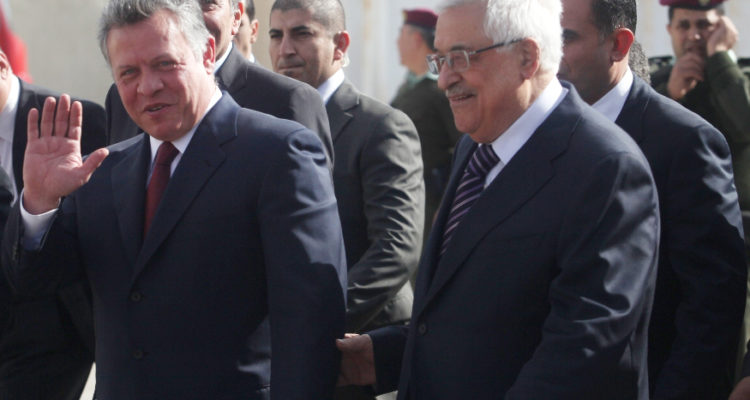During a meeting held in Amman, the Palestinian Authority president and Jordan’s king resolved to try to prevent other countries from following the US’ lead in recognizing Jerusalem as Israel’s capital.
By: Jack Ben-David
Jordan’s King Abdullah II met with Palestinian Authority President Mahmoud Abbas Thursday to discuss a coordinated response to US President Donald Trump’s speech the previous day in which he declared Jerusalem Israel’s capital.
Trump’s declaration, during which he also announced that he had instructed the US State Department to begin laying the groundwork for fulfilling an election campaign pledge to transfer the US Embassy in Israel from Tel Aviv to Jerusalem, sparked outrage throughout the Arab world and ushered in a wave of condemnation from international leaders.
The meeting between Abbas and Abdullah was part of a series of talks intended “to discuss the changes happening on the ground concerning the holy city,” according to the WAFA Palestinian news agency.
Held behind closed doors, the meeting was also attended by Crown Prince Hussein Bin Abdullah and a Palestinian delegation including Chief negotiator Saeb Erekat, member of the central committee Hussein al-Sheikh, intelligence chief Majed Faraj and Palestinian Ambassador to Jordan Attallah Khairi.
Abbas and Abdullah said during the meeting in Amman that Trump’s declaration––hailed by Prime Minister Benjamin Netanyahu as bearing equal historic significance as the Balfour Declaration, the founding of Israel and the liberation of eastern Jerusalem in 1967––was a violation of international law, with the king urging a continued momentum of international outcry in a bid to prevent any other countries from following President Trump’s lead on the status of Jerusalem.
‘Dangerous repercussions’
The two also reportedly discussed undertaking further efforts to inform the international community on what the Arab world has repeatedly described as the “dangerous repercussions” of Trump’s move.
Despite the US president’s declaration, the Jordanian king held fast to the notion that a future Palestinian state would include the eastern portion of Jerusalem as its capital.
“The issue of Jerusalem should be settled within a comprehensive solution that leads to the establishment of an independent Palestinian state with east Jerusalem as its capital living in peace and security alongside Israel,” Abdullah said.
According to reports, the king said that efforts had to be increased to safeguard the rights of Palestinians, Arabs and Muslims living in the Israeli capital.




